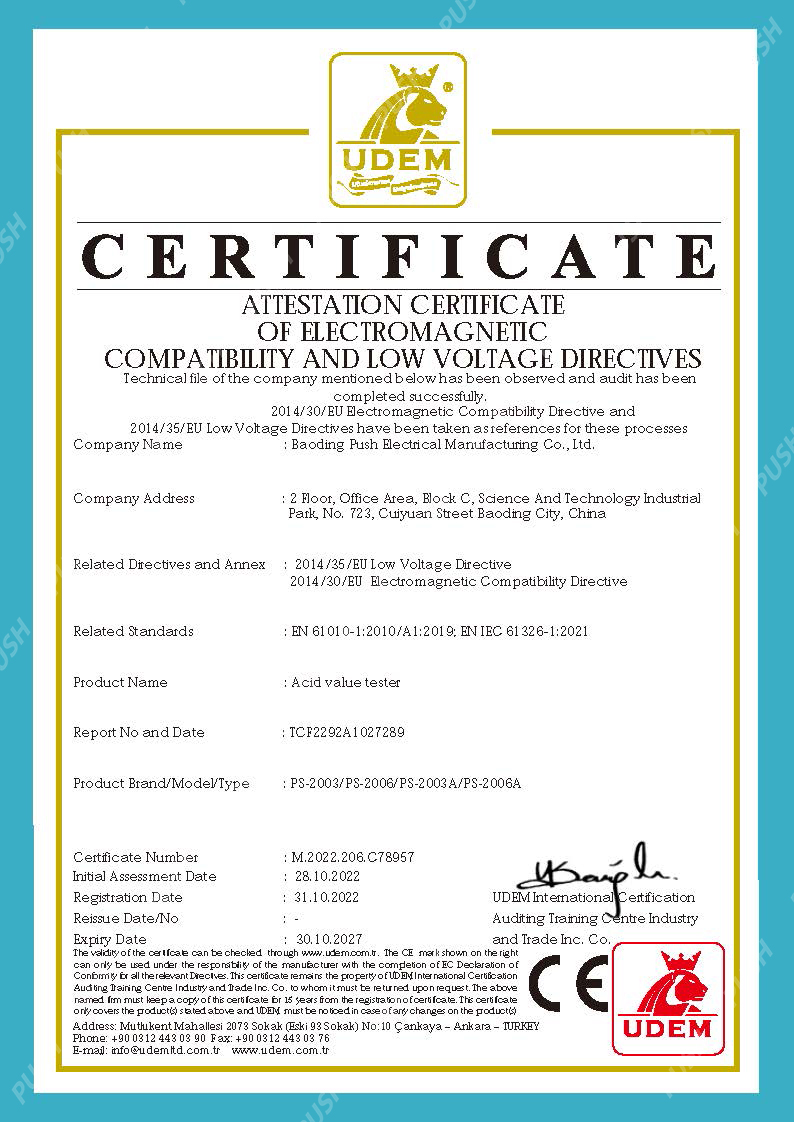 English
English


karl fischer auto titrator
Understanding the Karl Fischer Auto Titrator A Key Instrument for Moisture Analysis
The Karl Fischer titration method is a powerful analytical technique used for determining the moisture content in various substances. Developed by chemist Karl Fischer in the 1930s, this method has stood the test of time, evolving into more advanced instrumentation, such as the Karl Fischer auto titrator. This article explores the significance of this device, its working principles, applications, and advantages.
What is a Karl Fischer Auto Titrator?
A Karl Fischer auto titrator is an automated version of the classic Karl Fischer titration apparatus. It is designed to determine the water content in samples with precision and ease. The automation of this process significantly enhances efficiency, minimizes human error, and allows for unattended operation, which is particularly beneficial in high-throughput laboratories.
How Does it Work?
The basic principle of the Karl Fischer method hinges on the reaction between water and Karl Fischer reagent, which is a complex of iodine and sulfur dioxide in an organic solvent. The reaction can be summarized as follows
\[ \text{H}_2\text{O} + \text{I}_2 + \text{SO}_2 \rightarrow \text{H}_2\text{SO}_4 + 2\text{HI} \]
In an auto titration setup, the sample—whether a liquid, solid, or gas—is introduced into the reaction vessel where the Karl Fischer reagent is present. The auto titrator continuously adds reagent to the sample until all the water has reacted. The endpoint is typically detected either potentiometrically or colorimetrically, allowing for precise determination of moisture content.
Applications of Karl Fischer Auto Titrators
Karl Fischer titration is vital in many industries
. Common applications includekarl fischer auto titrator

1. Pharmaceuticals Accurate moisture measurement is crucial for drug stability and efficacy. Karl Fischer titrators ensure the quality of active pharmaceutical ingredients (APIs) and final products. 2. Food and Beverage Moisture levels in products like powders, oils, and liquids affect taste, texture, and shelf-life. Karl Fischer titration provides reliable data essential for quality control. 3. Petrochemicals Moisture in fuels and lubricants can significantly impact their performance. Accurate measurement ensures optimal product quality and regulatory compliance. 4. Cosmetics The moisture content in creams and lotions is critical for product texture and stability, making Karl Fischer titration a necessary quality control step.
Advantages of Using Karl Fischer Auto Titrators
1. Accuracy and Precision The automated nature of these devices reduces potential human error, providing highly accurate and repeatable results, which is essential in regulatory environments.
2. Efficiency Auto titrators can process multiple samples in a short amount of time, significantly increasing laboratory throughput and productivity.
3. Ease of Use User-friendly interfaces and automated workflows make these titrators accessible even for users with limited experience in analytical chemistry.
4. Versatility Modern auto titrators can be configured for various sample types and sizes, accommodating a broad spectrum of moisture analysis needs.
5. Data Management Many auto titrators come with advanced software capabilities for data management, allowing for easy storage, retrieval, and analysis of results, which is crucial for compliance with regulatory standards.
Conclusion
The Karl Fischer auto titrator stands as a cornerstone in the field of moisture analysis. By enhancing accuracy, efficiency, and ease of use, it plays a pivotal role in ensuring product quality across several industries. As analytical needs evolve, continued advancements in Karl Fischer technology promise to further increase reliability and precision in moisture measurement, supporting industries in their quest for quality and compliance. Whether in pharmaceuticals, food production, or petrochemicals, the Karl Fischer auto titrator remains an indispensable tool in modern laboratories.
-
Differences between open cup flash point tester and closed cup flash point testerNewsOct.31,2024
-
The Reliable Load Tap ChangerNewsOct.23,2024
-
The Essential Guide to Hipot TestersNewsOct.23,2024
-
The Digital Insulation TesterNewsOct.23,2024
-
The Best Earth Loop Impedance Tester for SaleNewsOct.23,2024
-
Tan Delta Tester--The Essential Tool for Electrical Insulation TestingNewsOct.23,2024





